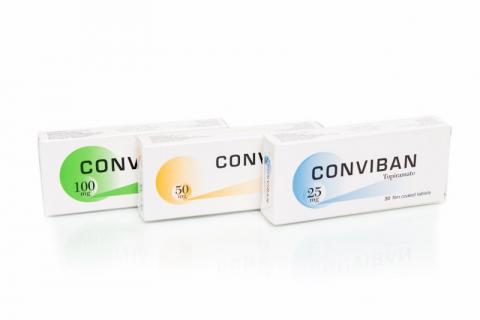Brand Name: Conviban 25mg Tablet
Conviban 50mg Tablet
Conviban 100mg Tablet
Active Ingredient: Topiramate
When is Conviban Tablet prescribed for?
Epilepsy:
- Monotherapy in patients 10 years of age and older with partial onset or primary generalized tonic-clonic seizures.
- Adjunctive therapy for adults and pediatric patients ages 2-16 years with partial onset or primary generalized tonic-clonic seizures.
• Migraine:
For prophylaxis of migraine headache, the usefulness of Conviban in acute treatment of migraine headache has not been studied.
How should you take Conviban Tablet?
- Epilepsy:
Monotherapy : the recommended dose for adults and children 10 years of age and older is 400 mg/day in two divided doses. The dose should be achieved by titrating according to the insert leaflet.
Adjunctive therapy use for adults (17 Years of age and over partial seizures, primary generalized tonic-clonic seizures recommended dose 200-400 mg / day
Pediatric Patients (ages 2-16 years) the total recommended daily dose is approximately 5-9 mg/kg/day in two divided doses. Titration should begin at 25 mg (or less based on range of 1-3 mg/kg/day) nightly for the 1st week increased at 1 or 2-week intervals by increments of 1 to 3 mg/kg/day in two divided dose to achieve optimal clinical response.
- Migraine:
The recommended total daily dose as treatment for prophylaxis of migraine headache is 100 mg/day titrating as described in the insert leaflet.
When you should not take Conviban Tablet?
CONVIBAN tablet is contraindicated in patients with history of hypersensitivity to any component of its product.
Possible Side effects of Conviban Tablet
• Adverse effects associated with CONVIBAN therapy include ataxia, impaired concentration, confusion, dizziness, fatigue, drowsiness, and difficulties with memory and cognition.
Agitation and depression may also occur.
• Other reported adverse effects include abdominal pain, anorexia, leucopoenia, nausea, alter taste, visual disturbances
and weight loss, speech disorder.
Special warning and precautions on using Conviban Tablet:
- CONVIBAN may cause you to be less alert than normal so used with caution before you drive.
- If you are taking a contraceptive pills as well as CONVIBAN tab and your menstrual bleeding patterns change consults your doctor.
- CONVIBAN used with caution with patient having kidney stone or problem in the liver.
- In renal impaired patient (creatinine clearance less than 70 ml/min) one half of the usual dose is recommended.
- The clearance of Topiramate is reduced in hepatic impairment. The drug should be used with caution in these cases.
- Avoid abrupt withdrawal.
- Ensure adequate hydration (especial if predisposition to kidney stones, excessive activity or warm environment).
- Avoid in porphyria.
- CONVIBAN has been associated with acute myopia with secondary acute angle-closure glaucoma, typically occurring within one month of starting treatment.
- If raised IOP occurs stop CONVIBAN as rapidly as feasible and seek specialist advice to reduce IOP.
Possible Drug interaction with Conviban Tablet
- The anticonvulsant effect of topiramate is possibly antagonized by antidepressants as MAOI, TCAs, SSRIs.
- Plasma concentration of topiramate is reduced by carbamazepine.
- Topiramate increases plasma concentration of phenytoin.
- The anticonvulsant effect of topiramate is reduced with the antimalarial drugs chloroquine, hydroxychloroquine
and mefloquine. - Topiramate accelerates the metabolism of estrogen and progestogens, this reduces the contraceptive effect of these drugs.
Special information if you are pregnant or breastfeeding
TOPIRAMATE should be used only if the potential benefit outweighs the potential risk to the fetus.

